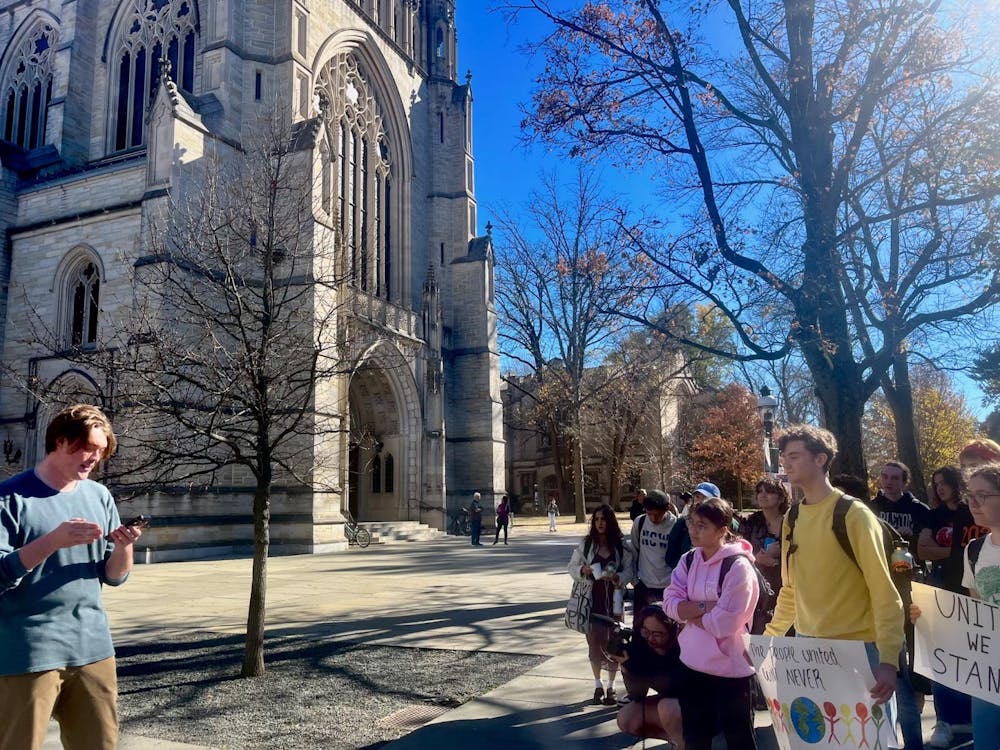Earlier this week, Americans had the chance to demonstrate their frustration with the Trump administration at the ballot box, delivering resounding wins in gubernatorial, down-ballot, and referendum races. And in the most impressive race of this cycle, the people of New York City elected Zohran Mamdani, a self-identified democratic socialist, to be their next mayor with an outright majority of the vote: 50.4 percent to Andrew Cuomo’s 41.6 percent.
Of course, the population, challenges, and structure of governance of the University differ significantly from New York City. But with this University’s history of defeatism, it’s important to learn from Mamdani’s victory. I believe that it gives Princeton progressives a replicable model for winning, which they can adapt from New York to this University: a people-centered mass movement that builds real community and seeks to genuinely persuade and excite others.
The traditional, cynical perspective of politics dictated that Mamdani, a Muslim and democratic socialist, should’ve been dead in the water from the moment his campaign began. At the beginning of the campaign, he polled at a mere one percent in the Democratic mayoral primary.
But Mamdani defied the odds, and rose to victory. Key to his improbable win was an army of 100,000 campaign volunteers, including young people who came out to knock on doors and phone bank in droves.
For many Mamdani-supporting New Yorkers, this army of volunteers was more than political voluntarism: It was a way of finding community. During the COVID-19 pandemic, New Yorkers were virtually isolated from each other, leading many young New Yorkers to describe themselves afterwards as adrift.
They found community, however, in Mamdani’s positive approach to politics. Although Mamdani often criticized Cuomo’s scandals, such as his history of sexual harassment allegations, he also gave his supporters a hopeful vision of the city for which to strive. To these people, “fast and free buses” and “freezing the rent” were not just policy proposals, but markers of unity. To further foster this community, Mamdani’s campaign organized a wide variety of socials, such as a scavenger hunt and soccer tournament.
This is inspiring, and demonstrates the ability for ordinary people to surpass this country’s traditional powerbrokers by creating welcoming and uplifting spaces. Too often, ordinary citizens can feel powerless and helplessly frustrated by our political system, which seems to disproportionately favor the interests of corporations and special interests over the interests of the public. But how, exactly, does this apply to Princeton?
As my friend Isaac Barsoum ’28 has argued in these pages, Princeton’s supposed culture of “apathy” comes from our belief that organizing has no impact. Although we care about political issues, as demonstrated by our high participation in electoral politics, we are not confident in our power to achieve anything through organizing.

Mamdani’s campaign offers important lessons for those of us who wish to organize at Princeton. First of all, we should advocate for policies that persuade and unite. We cannot just oppose the status quo; we need to create a compelling alternative that people want to strive for. But, especially in the context of a college campus, we have to encourage our hesitant peers to join us through creating a welcoming, uplifting, and empowering community.
I’m a member of Sunrise Princeton, which has been a wonderful community for me. Their agenda is clear, digestible, and exciting. But beyond that, there’ve been fun socials, such as an art build, and many opportunities to get on the ground, work with others, and feel personally bought into their activism.
There’s a saying in the activism world that culture eats strategy for breakfast — that it doesn’t matter how well your movement is organized if people don’t want to hang out with you. On a college campus, that can be life or death for a movement. This principle is all the more important to combat the incorrect perception that college activists are divisive and intolerant.
Imagine a Princeton that pays its staff workers a decent, livable wage: at least $26 per hour, instead of its current starting wage of $21.72 per hour. Imagine a Princeton that invests in environmental justice, instead of fossil fuels. We don’t need to imagine. We can make this all happen.

Today, November 7, there’ll be a rally at Firestone Plaza at 5 p.m. We’ll have music, fun posters, and most importantly, cool people who are ready to inspire you with the promise of the movement — and hopefully, you can inspire us, too! Over a hundred people have already committed to attending. Mamdani’s victory showed us that NYC belongs to the people. Princeton belongs to the people, too. We just need to prove it.
Raf Basas ’28 (he/him/his) is an Opinion columnist from Elk Grove, Calif. intending to major in English. Though he’s no Mayor-elect Mamdani, he hopes to improve the lives of the working class, and build an America that serves the people. You can reach him at raf.basas[at]princeton.edu or @raf.basas on Instagram. All of his columns can be read here.








